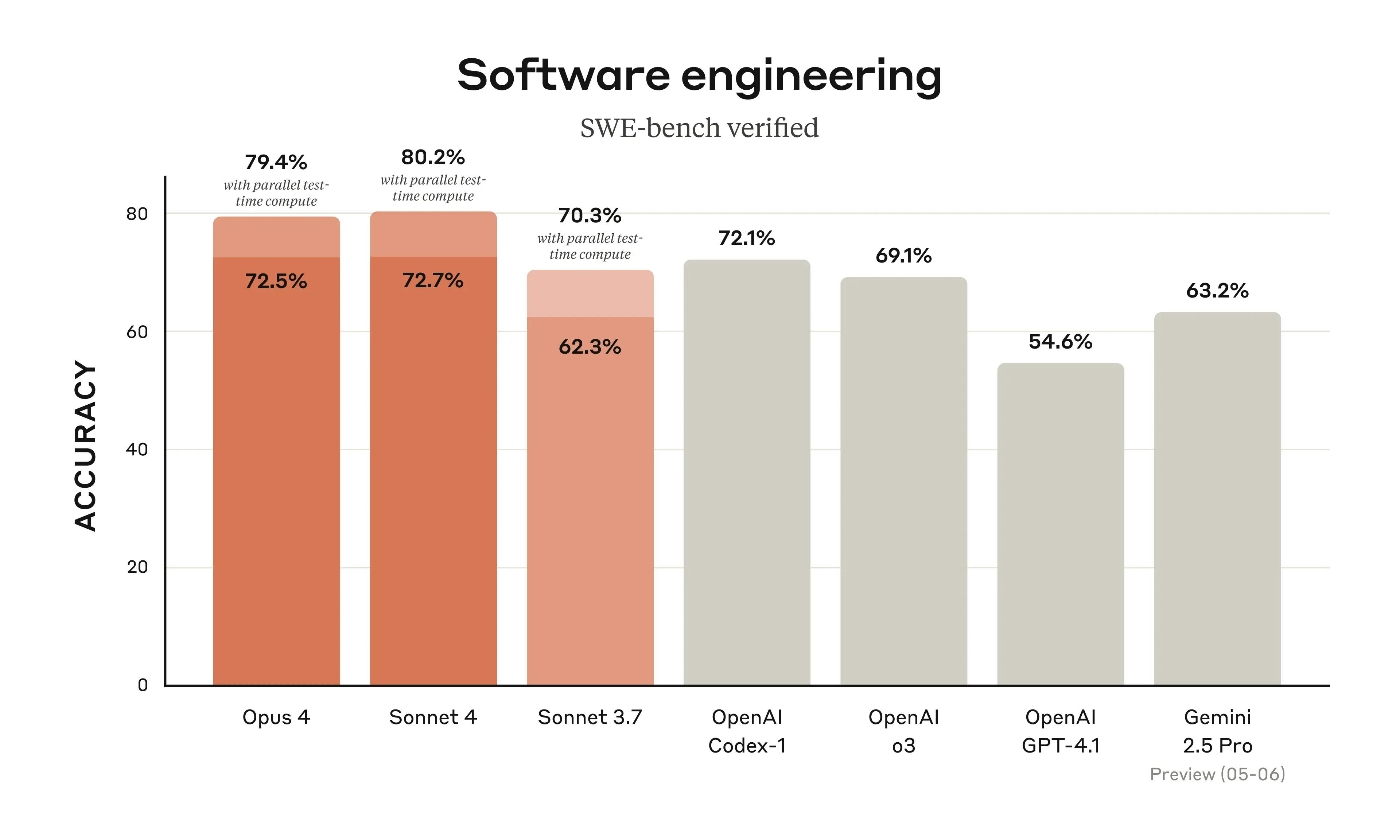Table of contents :
Claude 4: revolution in the world of generative AI
Wake up! 72% of developers lose more than 4 hours per week debugging faulty code. This statistic could soon be a thing of the past thanks to Claude 4, the new generation of artificial intelligence from Anthropic officially unveiled on May 22, 2025.
This major advancement doesn't just compete with industry giants – it surpasses them in several crucial areas, particularly in coding and complex data analysis. Whether you're a developer, content creator, or business decision-maker, Claude 4 promises to radically transform your relationship with artificial intelligence by offering unprecedented capabilities in hybrid reasoning and intelligent automation.
Two complementary models: Claude Opus 4 and Claude Sonnet 4
What fundamental differences exist between Opus 4 and Sonnet 4?
Claude 4 comes in two distinct versions, each designed to meet specific needs. Claude Opus 4 represents the premium version, capable of sustained performance on complex tasks requiring thousands of reasoning steps. Its ability to maintain unwavering focus for several hours makes it the ideal tool for large-scale projects. Claude Sonnet 4, more accessible, offers an optimal balance between power and practicality for everyday tasks, with increased responsiveness and better adherence to precise instructions.
How to choose between the two versions based on your needs?
The choice between Opus 4 and Sonnet 4 essentially depends on the complexity of your projects. Opt for Opus 4 for tasks requiring in-depth analysis of voluminous data, complex code generation, or advanced scientific research. Sonnet 4 excels in daily writing, conversational assistance, and medium-sized coding projects. Looking for a simple solution? Sonnet 4 offers the best value for money for the majority of users, while Opus 4 is intended for professionals who need maximum computing power.
Why did Anthropic develop a hybrid architecture?
The major innovation of Claude 4 lies in its hybrid architecture that allows switching between two modes: near-instant responses or deep reflection. This revolutionary approach solves the eternal dilemma between speed and depth of analysis. By allowing AI to alternate between autonomous reasoning and the use of external tools such as web search, Anthropic has created a system capable of dynamically adapting to the complexity of each query. This flexibility represents a considerable advance over previous models, which were limited to a single mode of operation.
Exceptional coding performance
Which benchmarks place Claude 4 at the top of coding models?
Claude 4's coding performance is particularly impressive on reference benchmarks. On SWE-bench, which evaluates the ability to solve real programming problems, Claude Opus 4 and Sonnet 4 achieve 72.5% and 72.7% success rates respectively, significantly outperforming GPT-4.1 and its 55%. On Terminal-bench, which tests interaction with development environments, Opus 4 reaches 43.2%, setting a new standard. These results are not just numbers – they translate into a concrete ability to produce functional, maintainable, and optimized code.

Source : Anthropic
How does Claude Code work in practice?
Claude Code, now generally available, integrates directly into your development environment via extensions for VS Code and JetBrains. Proposed modifications appear directly in your files, facilitating their review and integration. The system can also be invoked via GitHub to respond to code review comments or automatically fix continuous integration errors. This seamless integration transforms Claude 4 into a true development partner, capable of progressively learning the specifics of your codebase.
What advantages for developers in daily work?
For developers, Claude 4 represents a considerable time saving. Its ability to generate unit tests, refactor legacy code, or automatically document complex functions drastically reduces repetitive tasks. Even more impressive, Claude 4 can maintain its focus on entire projects, understanding the interdependencies between modules and suggesting relevant architectural optimizations. Make your site more visible with these simple and effective tips: use Claude 4 to analyze your existing code and identify performance improvement opportunities often invisible to the human eye.
Comparison with GPT-4 and other competitors
Where does Claude 4 outperform GPT-4 and Gemini?
Claude 4 stands out primarily in three areas: coding, multi-step reasoning, and instruction fidelity. In coding, as mentioned previously, it outclasses GPT-4.1 by 17 points on SWE-bench. Its hybrid architecture also gives it an advantage for tasks requiring in-depth reasoning, as evidenced by its score of 89% on MMLU compared to 87% for GPT-4.1. Finally, Claude 4 is 65% less likely to use shortcuts or loopholes to accomplish tasks, ensuring stricter adherence to user instructions.
What are the current limitations of Claude 4?
Despite its impressive performance, Claude 4 has some limitations. GPT-4 maintains a slight advantage in creative and literary tasks, sometimes offering more original responses. The Opus version, although powerful, can be oversized for simple tasks, resulting in unnecessary resource consumption. Furthermore, like all large language models, Claude 4 remains dependent on its training data and can occasionally produce incorrect information, although this phenomenon is significantly reduced compared to previous generations.
How do the different models position themselves in terms of value for money?
In terms of value for money, Claude Sonnet 4 probably offers the best balance for most users. It is comparable to GPT-4o but excels in coding performance. Claude Opus 4 represents a more significant investment, justified for complex projects requiring in-depth analysis. Gemini 2.5 Pro offers slightly lower prices but with lesser performance on technical benchmarks. Every step counts in improving your site, and the choice of model should align with the complexity of your specific needs.
Concrete applications for businesses
How to leverage Claude Opus 4 for complex tasks?
Businesses can take advantage of Claude Opus 4 to transform their most demanding processes. Complex legal contract analysis becomes more efficient thanks to its ability to maintain context across entire documents. Research and development teams benefit from its ability to synthesize interdisciplinary scientific publications to identify new innovation paths. In the financial sector, Opus 4 excels in analyzing macroeconomic trends by integrating thousands of variables. Its ability to maintain consistency on projects for several hours makes it an invaluable assistant for tasks requiring sustained concentration.
When to favor Sonnet 4 for daily efficiency?
Claude Sonnet 4 particularly shines in daily operations requiring reactivity and precision. The drafting of marketing communications, customer feedback analysis, or activity report generation are optimized by its processing speed and nuanced understanding of instructions. Sales teams successfully use it to personalize their proposals in real-time during customer calls. Its superior steerability also allows it to be finely adapted to the company's brand voice, ensuring perfect stylistic consistency. Apply these tips and observe the results quickly: integrate Sonnet 4 into your daily workflows for an immediate productivity gain.
Which sectors benefit most from Claude 4's advanced capabilities?
The technology sector naturally exploits Claude 4 to accelerate its development cycles, but other industries also derive substantial benefits. The medical sector uses its analytical capabilities to interpret complex clinical data and identify novel correlations. Law firms automate jurisprudential research and contractual document drafting. The manufacturing industry optimizes its supply chains through predictive modeling. The education sector personalizes learning paths by analyzing student performance. This versatility makes Claude 4 a catalyst for innovation across many fields of activity.
Claude 4: best use on Swiftask
How does Swiftask optimize the Claude 4 experience?
Swiftask revolutionizes the use of Claude 4 by integrating it into an ecosystem of specialized AI agents. The platform amplifies Claude 4's capabilities by allowing it to access a multitude of external tools and data sources, thus overcoming the usual limitations of conversational interfaces. Swiftask also facilitates context persistence between sessions, allowing Claude 4 to resume exactly where you left off, even after several days. This synergy transforms Claude 4 from a simple conversational assistant into a true digital collaborator capable of orchestrating complex workflows and interacting with your digital ecosystem.
Which professional workflows can be transformed with Swiftask and Claude 4?
The Swiftask-Claude 4 combination redefines many business processes. Competitive intelligence becomes fully automated, with agents monitoring relevant sources and producing actionable syntheses. Multi-format marketing content generation (articles, newsletters, social posts) is performed in parallel from a single brief. Customer data analysis transforms into strategic insights thanks to integration with your CRM tools. Looking for a simple solution? Here's how: configure a dedicated Swiftask agent for each department in your company, customizing Claude 4 according to their specific needs to maximize the relevance of results.
Creating an AI agent with Claude 4 on Swiftask
Creating a customized AI agent on Swiftask becomes accessible even to non-technicians. Start by precisely defining the objective of your agent and select Claude 4 Opus or Sonnet depending on the complexity of the tasks envisaged. Then configure the data sources your agent will have access to: internal documents, knowledge bases, specific websites. Define the tools your agent can use, such as data analysis, image generation, or email sending. Finally, customize the personality and tone of your agent to perfectly align with your brand. In just a few hours, you'll have a virtual collaborator capable of automating your most time-consuming tasks with unmatched precision.
The Claude 4 revolution is just beginning, and its integration with platforms like Swiftask opens up unprecedented perspectives for intelligent automation. Every day, new use cases emerge, pushing the boundaries of what AI can accomplish. By judiciously exploiting the complementary strengths of Opus 4 and Sonnet 4, organizations of all sizes can now access analysis and automation capabilities once reserved for tech giants. Make your company more competitive with these cutting-edge tools and observe the transformational impact on your productivity and innovation capacity.
author
OSNI

Published
May 25, 2025